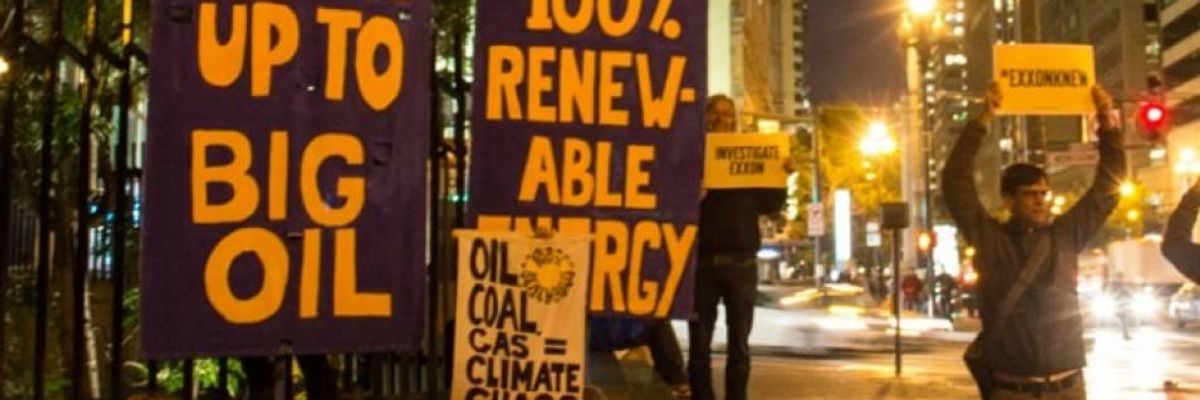At 8 am on a Wednesday morning last month, two federal District Court courtrooms in San Francisco were jammed with lawyers, scientists, journalists, and climate activists--and more people were lined up down the hall, eager to listen to five occasionally riveting hours of climate science. Judge William E Alsup, on the U.S. District Court for the Northern District of California, is hearing a case that could have existential consequences for the cities of Oakland and San Francisco and the giant oil companies they are suing for past and future climate change-related damages. On Wednesday he asked both sides to school him on climate science and the mechanisms by which CO2 causes global warming.
The plaintiffs were represented by climate scientists with a lot of technical expertise and varying communications skills. They answered the judge's eight questions and engaged with him on details large and small. Theodore Boutrous, the attorney for Chevron, chose not to answer the questions, but instead reviewed uncertainties expressed about the extent of sea level rise in the Fifth Assessment Report of the United Nations Intergovernmental Panel on Climate Change (IPCC)... which was based on the best available science in 2012.
Even the climate-deniers weighed in, as the Koch-funded Heartland Institute submitted a friend-of-the-court brief stating that the effects of global warming, if any, will be "small, slow, and net-beneficial."
Beyond his extended statement of agreement with the report, Boutrous' apparent goal was to drive home the argument that fossil fuels don't cause global warming, people do. (The other defendants are ExxonMobil, BP, Conoco-Phillips, and Royal Dutch Shell, represented at the tutorial by Chevron.) Even the climate-deniers weighed in, as the Koch-funded Heartland Institute submitted a friend-of-the-court brief stating that the effects of global warming, if any, will be "small, slow, and net-beneficial."
Strangely absent from the proceedings was Xavier Becerra, Attorney General of California. Doesn't the AG, and the state, have a dog in this fight?
Since soon after Governor Jerry Brown appointed him to Kamala Harris' old job in December 2016, Becerra has been under increasing pressure to join New York Attorney General Eric Schneiderman and Massachusetts A.G. Maura Healey in investigating Exxon. Schneiderman and Healey believe that the oil giant systematically misled shareholders and the public about the realities of human-caused climate change and its inevitable consequences for the company's future prospects. They have long been investigating the disconnect between Exxon's public pronouncements and its own scientists' understanding of global warming during the years when policymakers could have taken effective action to slow warming and reduce its harmful effects.
It is ironic and sadly fortunate that the companies that have profited so greatly for so long from their iron grip on the global economy actually have the resources to mitigate much of the havoc their operations have wreaked on the world.
The consistent response from Becerra's office--to demonstrations, petitions, and a meeting last week with some of the largest environmental advocacy groups in the state--has been that the AG likes to keep quiet about investigations so as not to tip off targets...so...maybe he is investigating, but maybe he isn't. In this instance the secrecy policy doesn't make much sense, since Schneiderman and Healey announced their investigations years ago, and a public announcement from California (not to mention the addition of Becerra's considerable resources to the project) could only help the cause and expedite a suit, if one is to be brought.
The connection between the Exxon investigations and the municipal suits against the oil companies is clear. All of the suits (including another stream of suits brought by San Mateo, Marin, and Santa Cruz counties, and the cities of Santa Cruz and Imperial Beach) reference Exxon's obfuscation, which is also key to rebutting Exxon's counterclaim that the municipalities should have included information about climate risk in their bond offerings.
In fact, all of California has a stake in both the municipal suits and the Exxon investigation. The costs of armoring airports and some of the most expensive real estate in San Francisco, and underwriting "managed retreat" from low-lying coastal areas around San Francisco Bay, on the north coast, and in Orange and San Diego counties will dwarf even the $9 billion estimated damages from recent fires, floods, and mudslides. And that's not counting future climate-related disasters as weather becomes more extreme.
It is ironic and sadly fortunate that the companies that have profited so greatly for so long from their iron grip on the global economy actually have the resources to mitigate much of the havoc their operations have wreaked on the world. It's looking more and more as if it's going to be up to the courts, here and abroad, to make them pay. As usual, California is right in the middle of this fight. We need our attorney general to step up--and step in.




